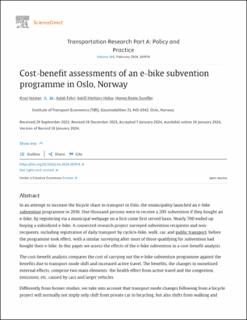Cost-benefit assessments of an e-bike subvention programme in Oslo, Norway
Journal article, Peer reviewed
Published version
Permanent lenke
https://hdl.handle.net/11250/3120291Utgivelsesdato
2024-01-19Metadata
Vis full innførselSamlinger
Originalversjon
Transportation Research Part A: Policy and Practice. 2024, 180 (February 2024), 1-14. 10.1016/j.tra.2024.103974Sammendrag
In an attempt to increase the bicycle share in transport in Oslo, the municipality launched an e-bike subvention programme in 2016. One thousand persons were to receive a 20% subvention if they bought an e-bike, by registering via a municipal webpage on a first come first served basis. Nearly 700 ended up buying a subsidised e-bike. A connected research project surveyed subvention recipients and non-recipients, including registration of daily transport by cycle/e-bike, walk, car, and public transport, before the programme took effect, with a similar surveying after most of those qualifying for subvention had bought their e-bike. In this paper we assess the effects of the e-bike subvention in a cost-benefit analysis. The cost-benefit analysis compares the cost of carrying out the e-bike subvention programme against the benefits due to transport mode shift and increased active travel. The benefits, the changes in monetised external effects, comprise two main elements: the health effect from active travel and the congestion, emissions, etc. caused by cars and larger vehicles. Differently from former studies, we take into account that transport mode changes following from a bicycle project will normally not imply only shift from private car to bicycling, but also shifts from walking and public transport to cycling. Moreover, some of the negative external effects from private cars and public transport vehicles are already internalised via taxation and can be deducted from the calculations. Our ex-post assessment of the implemented e-bike programme indicates that the benefits in the year of implementation probably surpassed the costs of the programme. The benefit calculation was relatively robust to alternative assumptions for the road transport (the share of electric cars, the occupancy in public transport, and the share of congested travel), but relatively less robust to altered assumption about the active travel. However, if there is an impact of the e-bike subvention programme beyond the implementation year, we have underestimated the benefits. Cost-benefit assessments of an e-bike subvention programme in Oslo, Norway
Beskrivelse
Knut Veisten, Aslak Fyhri, Askill Harkjerr Halse, Hanne Beate Sundfør, Cost-benefit assessments of an e-bike subvention programme in Oslo, Norway, Transportation Research Part A: Policy and Practice, Volume 180, 2024, 103974, ISSN 0965-8564, https://doi.org/10.1016/j.tra.2024.103974.

